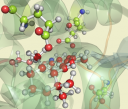The simple life: Liquid Orange.
There are two possible alternatives; in this short life you can either synthesise the following chemical compounds:
limonene, myrcene, valencene, linalool, octanal, decanal, ethyl butyrate, ?-ionone, citronellal, and ?-sinensal, E-2-octenal, 1-octen-3-ol, Z-4-decenal, E, E-2,4-nonadienal, guaiacol, ?-octalactone, and m-cresol, O-glycosylated flavones, flavonols, phenolic acids, ethyl acetate, 6-C-?-glucosyldiosmin, 6,8-di-C-glucopyranosylapigenin, 6,8-di-C-?-glucosyldiosmin, 2-oxo-L-threo-hexono-1,4- lactone-2,3-enediol, beta carotene, 2-hydroxypropane-1,2,3-tricarboxylic acid, heteropolysaccharide and assimilate them by complex hydrolysis,
or
you can pluck an orange and eat it.
But although we can synthesise many many complex molecules such as these, there is currently no way we can ‘manufacture’ a wholey artifical fruit identical in every way to a naturally grown one. Even though it takes an enourmous effort to characterise these natural chemical compounds and synthesise them, and nature does it for free with soil, sunlight, air and water, we still try. Without a plant seed, or a tissue culture sample, or a DNA strand, there is no way we’ll be able to do it either. I say that with all things considered, the natural source will always be the healthier alternative…
Someone stupid might say that at this level of investigation, the two alternate possibilities above are both essentially the same thing. And I’ll be the first to respond that while the consituents may be present in the artificial chemical cocktail, the microstructure of the fruit is absent. What’s my point? Well, without any prior knowledge on the subject of the human digestion process, I’ll make an assumption that the structure of food is needed to aid in both the chemical breakdown of the food and the timely extraction of its nutrients. I’ll bet that introducing the same mixture of concentrated liquid chemicals simultaneously into your body won’t do your stomach lining any good. Time has shown us that there is always a price to play for taking shortcuts, especially with concentrated synthetic chemicals. Indeed, cancer is now one of the greatest of all threats to our biology – in fact it is now common for people to suffer bowel cancer due to the lack of fibre in their diet.
But aside from that, who actually wants to eat synthetic food? Do we not have time anymore to simply peel an orange? Or is there something else going on? Something deep, dark and insidious. It is my belief that without even realising it, we’re creating an artificial world for ourselves, with almost no control or direction. As technology invades more and more of our lives it erodes the natural; every part, everything from our food to our transport and even our entertainment are now designed by other people. We seek to study everything and replicate it, including life itself. Why? And are we that blind that we never see the big picture?
[poll=11]






Hey nif
After going to Mildura, VIC Australia and tasting a bag of roadside oranges, for $2 AUS straight from the farm, that are more red than orange, juicy and oh so sweet……..give me the real sugar baby!
organic
/non gm/
fresh/
bio-organic/
hand picked is best!!!
I haven’t tasted a decent «real»watermelon in years….
regards Michelle